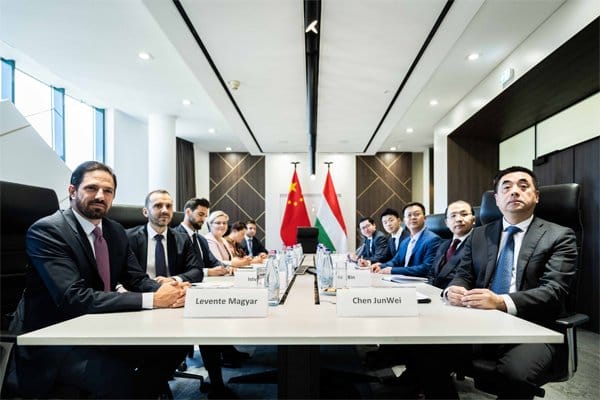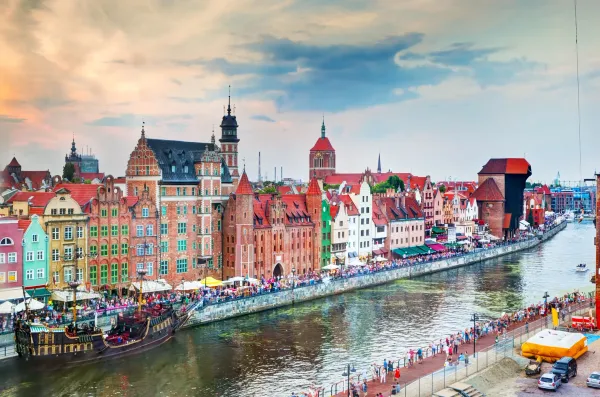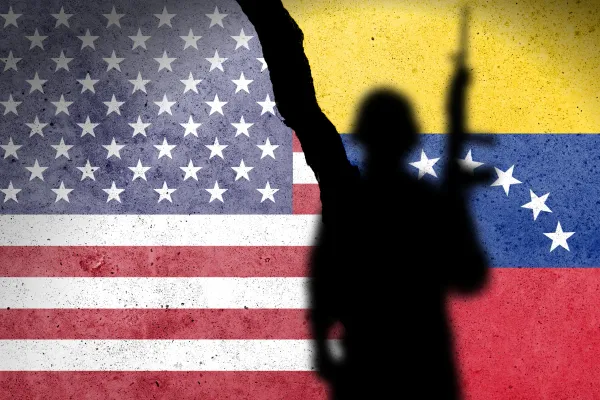
Chinese market leader CATL to build EUR 7.6bn battery plant in Hungary
The world’s largest battery maker, China’s Contemporary Amperex Technology (CATL), has agreed to build a three trillion forint (EUR 7.6bn) production plant in Debrecen, east Hungary.
Hungarian Foreign Ministry state secretary Levente Magyar said the deal represents the largest ever greenfield investment in the history of the country.
The 100 gigawatt hours (GWh) project will occupy 221 hectares and employ around 9,000 people. The investment will spur electric vehicle manufacturing in Hungary, Magyar added.
The investment will be implemented in the Southern Industrial Park in Debrecen, close to some of its customers’ car factories including Mercedes-Benz, BMW, Stellantis and Volkswagen.
Mercedes amongst those to welcome milestone in electric vehicle production
Robin Zeng, founder and president of CATL, said the project will enable the company to meet European market battery demand, develop its global production network, contribute to e-mobility, and speed up Europe’s energy transition.
Markus Schafer, Mercedes-Benz Group AG board member and technical director responsible for development and procurement, called the plant another milestone in the expansion of electric vehicle production.
“In CATL, we were able to get to know a high-tech manufacturing partner that provides us with the highest quality, carbon-neutral battery cells as the first and largest customer of the new plant for new-generation electric vehicles in Europe, thus following our purchasing approach that favours local partners,” Schafert added.
CATL said in a statement that Hungary, and particularly Debrecen, offers a stable business environment, developed infrastructure and logistics networks, a long history of car manufacturing and a large and competitive workforce, making it the perfect choice for CATL’s second European battery plant.
The Chinese company added that it will use electricity from renewable energies and may implement solar energy with local partners.
Eastern Opening has been long-term strategy for Orban government
The agreement is the result of more than two years of negotiations, however the story goes back as far as 2010, when Hungarian Prime Minister Viktor Orban returned to power and proclaimed Hungary’s “Eastern Opening” policy.
In March 2018, Polish news website Gazeta reported that Germany, Poland and Hungary were in the running to host CATL’s first plant in Europe, noting that LG, CATL’s Korean competitor, had chosen Poland for its car battery factory.
Four months later Reuters reported that CATL had chosen Germany as the site of its first plant, partly because carmakers including Daimler and BMW had signed large electric battery supply contracts with CATL for the supply of batteries for cars.
At the time, portfolio.hu noted that CATL had tripled production capacity last year and planned to reach 50Gw/h by 2020, which, the Hungarian business website added, is even larger than Tesla’s new factory in Nevada, which has an annual capacity of 35 Gw/h.
China controversial issue for Hungarians
In April 2020, Hungary and China signed a loan agreement to finance the construction of a railway link between Budapest and Belgrade, kickstarting a project that has been stalled for years. The project, part of China’s One Belt, One Road initiative is intended to open new foreign trade links for Chinese firms, and represented the first major Chinese infrastructure project inside the EU.
The following year, China’s plan to open its first foreign university campus in Budapest triggered protests in the Hungarian capital after leaked documents showed the government would take out a USD 1.5bn loan from a Chinese bank to cover the majority of the project’s costs.
When Hungary’s Constitutional Court blocked a referendum on the transfer of assets to a foundation supporting the local campus of the Fudan University earlier this year, Budapest Mayor Gergely Karacsony said the majority of the court’s members had “obviously fulfilled the political expectations of Fidesz.
Tellingly, when Orban secured his fourth consecutive election victory in April 2022, he reportedly received his first congratulatory call from Chinese Foreign Minister Wang Yi. This came just two days after a highly charged EU-China summit, at which EU leaders pressed Chinese President Xi Jinping on his support for Russia.
Hungarian Foreign Minister Peter Szijjarto said he had told Wang that “Hungary firmly supports EU-China friendship and will continue to play a constructive role in the development of EU-China relations with a respectful and pragmatic attitude.”
“China needs Hungary more than ever before. China has been losing friends here in Eastern Europe. So the friendship of Mr. Orban seems to be growing in importance,” Professor Tamas Matura of Budapest’s Corvinus University told the South China Morning Post.
In further shows of prioritising bilateral relations, last year Hungary vetoed an EU move to cancel its extradition treaties with China over the crackdown on political opponents in Hong Kong, and also approved Chinese vaccines before they had been accepted by the European Medicines Agency.
Orban says Hungary adjusting to global economic tectonic shifts
“We are in an alliance with the West, but we also want to build an advantageous relationship with the emerging new superpower, Orban said. China will soon overtake the US as the world’s dominant economic and military power, and that Hungary should position itself accordingly, according to the Hungarian premier.
“America is in decline, while China is getting stronger. Hungary, with ten million people, has to manoeuvre deftly in this period,” Orban said.
Although Hungary’s dalliance with China is a divisive issue in the CEE country, a report from the Budapest-based Central and Eastern European Center for Asian Studies (CEECAS) found that a majority of Hungarian voters saying they approve of rising Chinese influence in the country. The CEECAS poll found that 51% of Hungarian voters felt optimistic about China’s expanding footprint in the country.
Last week, as Estonia and Latvia followed their neighbour Lithuania and exited the China+17/16 trade initiative in CEE, Hungary was travelling in the opposite direction, as Foreign Ministry state secretary Tamas Menczer wrote that Hungarian foreign policy is “consistently committed” to the One China principle.
“We sincerely hope that the situation in Taiwan will not escalate and world powers will return to cooperation based on mutual respect and trust as soon as possible,” Menczer wrote on Facebook.
Further details on the CATL plant in Debrecen will be announced once approval by the Chinese company’s shareholders council is granted, Menczer’s colleague Magyar said when the CATL project was unveiled later that week. Depending on the approval of the shareholders’ meeting, construction could begin this year, he added.
Magyar opined that the agreement “also confirms that the government made the right decision when it announced its strategy to open to China and identified the electric vehicle industry as one of the main arms of Hungarian economic development”.





